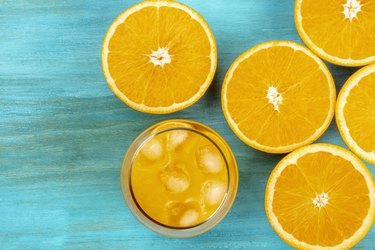
When you're in the midst of a painful gout flare-up you may be wondering to yourself: was it something I ate? Though there is some evidence that orange juice and gout may not be a good combination, the jury is still out.
Tip
Whether orange juice is bad for gout remains to be seen. However, to minimize flare-ups, you may want to drink orange juice in moderation.
Video of the Day
If you're searching for ways to reduce your gout flare-ups or have questions about the gout diet, consult with your primary care provider for guidance.
Video of the Day
A Little About Gout
At one time gout was referred to as the "rich man's disease," according to the Arthritis Foundation, because the painful form of arthritis was closely associated with extravagant foods such as scallops, veal and red meat, as well as alcohol. Though these foods contain substances that may contribute to your tender, swollen joints, there may be other factors involved too.
Gout is a metabolic form of arthritis caused by high levels of uric acid in your blood. Uric acid is a byproduct of purines, which is a substance naturally found in your body and in some of the foods you eat.
Normally, your kidneys filter uric acid from your blood and get rid of it in your urine. But if your body is making too much uric acid or your kidneys can't get rid of it fast enough, blood levels rise. Too much uric acid in your blood creates needle-like crystals called urate crystals, which settle in your joints and the surrounding tissue and cause your gout attack.
Though gout may affect any joint in your body, it most often attacks the joint in your big toe. Gout flare-ups develop quickly and cause pain that may last days or weeks.
Anyone can develop gout. However, you may be at greater risk if you're male, it runs in your family or if you have obesity, according to the Centers for Disease Control and Prevention. Your diet is also a risk factor, which is where orange juice comes into play.
Read more: List of Uric Acid Foods
Orange Juice and Gout
When it comes to selecting a juice to include in your diet, orange juice is a good choice because it's a good source of vitamin C, folate and potassium, says the USDA. However, most of the calories in orange juice come from sugar, specifically fructose. The Mayo Clinic says fructose-sweetened beverages increase uric acid levels in the blood. However, the evidence that orange juice is bad for gout is conflicting.
An October 2016 systematic review and meta-analysis of prospective cohort studies published in BMJ Open found a positive correlation between fructose consumption and gout in white health professionals. However, the authors of the study recommended more research to better understand the correlation between fructose and gout.
Another study published in the April 2019 issue of Clinical Nutrition specifically investigating the association between orange juice and gout concluded that the juice did not increase risk of the painful arthritis. The researches further noted that the juice may actually reduce uric acid levels.
However, this was a very small study that included only 26 young, healthy males. Larger, more diverse studies may provide more conclusive answers to the orange juice and gout questions.
Read more: What Vegetables Should Gout Sufferers Avoid?
The Gout Diet
Medication is the primary treatment for gout, according to the Mayo Clinic. However, a gout diet may help keep uric acid levels low and reduce your risk of flare-ups. Organ meats, such as liver and sweetbreads, are high-purine foods that may affect uric acid levels, and the Mayo Clinic suggests avoiding these meats on your gout diet. You may also want to reduce or eliminate your consumption of beer and distilled liquor, especially during a flare-up.
Red meat and seafood are also high-purine foods, but you don't need to eliminate these proteins when following a gout diet. You should, however, keep portion sizes moderate. Fructose is naturally present in all fruits, which may make you wonder about other fruits bad for gout, not just orange juice. However, the Arthritis Foundation recommends you keep fruit on your gout diet, but eat it in moderation. For general health, the USDA's ChooseMyPlate.gov says adults need 1 to 2 cups of fruit a day.
- Arthritis Foundation: "Fructose and Gout: What's the Link?"
- Mayo Clinic: "Gout"
- USDA: FoodData Central: "Orange Juice, 100 Percent, Canned, Bottled or in a Carton"
- Centers for Disease Control and Prevention: "Gout"
- BMJ Open: "Fructose Intake and Risk of Gout and Hyperuricemia: A Systematic Review and Meta-Analysis of Prospective Cohort Studies"
- Clinical Nutrition: "High Intake of Orange Juice and Cola Differently Affects Metabolic Risk in Healthy Subjects"
- Mayo Clinic: "Gout Diet: What's Allowed, What's Not"
- ChooseMyPlate.gov: "All About the Fruit Group"